How to change desktop theme on Linux Mint
Over the years, Linux Mint has undergone a number of changes, including some that are aesthetically different from the original visual appearance. As part of this change, Mint now allows you to choose from multiple themes to customize your desktop to your liking.
If you're just getting started with Mint, here are all the different ways to change the theme.
Different ways to change themes on Linux Mint
On Linux Mint, you can change the theme in three ways. One, you can choose a theme from the default options on the system (and customize it). Second, you can find and install new themes from the official Mint library. Third, you can download themes from other online resources and install them on your system.
Here are the instructions for changing the theme using each of these methods.
1. Install a new theme from Preferences
Depending on the desktop environment you are using on your system, you will have a wide range of pre-installed themes to choose from.
To access these themes, press the Super key to bring up the Applications menu. Search for "appearance" and click on the appropriate result to launch Appearance Preferences.
Click Theme and it will show you all the system themes you can use. Select a theme to see how it works and set it as your current theme.

If you like one of these themes but still want to change some elements, click the Customize button to do so. The customization options include Controls, Window Border, Icons, and Pointer.
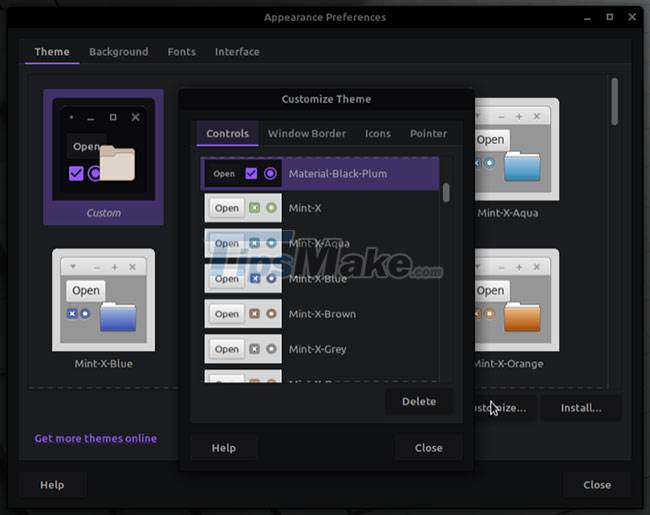
Click on any of these elements in the Customize Theme window to see all of its options, and tap the one you want to preview.
After you have customized the theme, click Close to save the changes. If you want to use this theme in the future, be sure to save it. To do this, click the Save As button. Then, on the Save Theme As window, fill in the Name and Description fields, and then click the Save button.
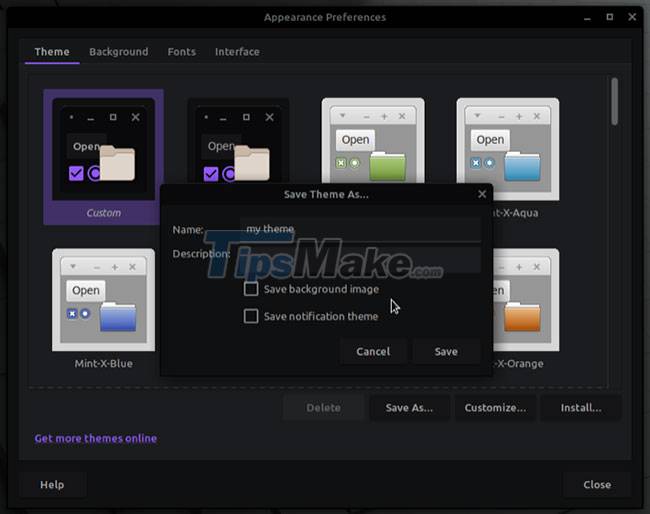
This opens up the possibility of a more personalized experience, as you can now combine styles for all the different system elements across different themes to create a complete option. Customizable for Linux Mint, to suit your style.
2. From the Linux Mint . Online Theme Store
If the limited theme collection doesn't impress you, Linux Mint also has a wide range of themes on its online store. They are hosted on Pling and you can access them right from the theme settings.
However, before downloading these themes, you need to install ocs-url, which is a helper program that allows you to install theme files directly from Pling.
For this, visit opendesktop.org, where the host ocs-url. Here, click the Download button on the right hand side of the screen and select the ocs-url file ending with the .deb extension from the drop-down menu.
Click the Download button on the following screen to start the download. After downloading the file, go to the Downloads folder. Right click on the file and select Open With GDebi Package Installer to install.
Alternatively, you can also install the DEB file from the Terminal. To do this, open Terminal, type the following command, and press Enter:
sudo dpkg -i ocs-url_x.xx-ubuntu1_amd64.deb
With ocs-url installed, you are now ready to use themes from Pling. To do this, launch Appearance from the applications menu. In Appearance Preferences, switch to the Themes tab and click Get more themes online at the bottom to access the appropriate theme repository for your desktop environment.
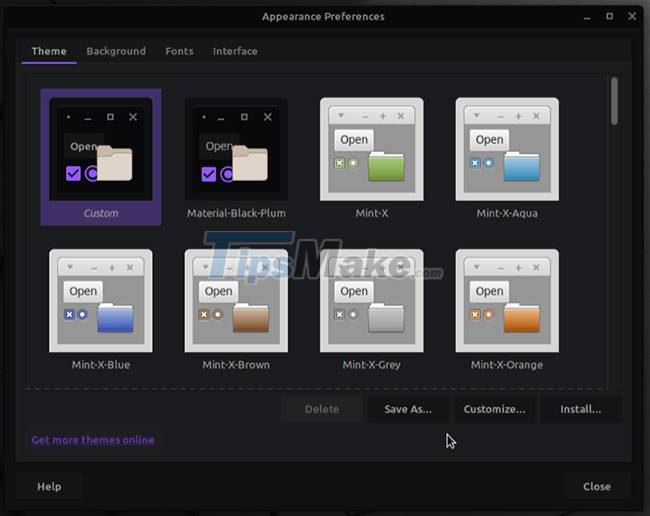
Depending on what you prefer, choose the GTK 2.x or GTK 3.x theme on the homepage. You will now be taken to the entire desktop theme library. Here you can filter themes by latest, rating or ping. Furthermore, click on the theme options on the left pane to explore more options.
When you like a theme, click on it to expand its details, as well as download/install options. Click the Install button and select a file from the drop-down menu.
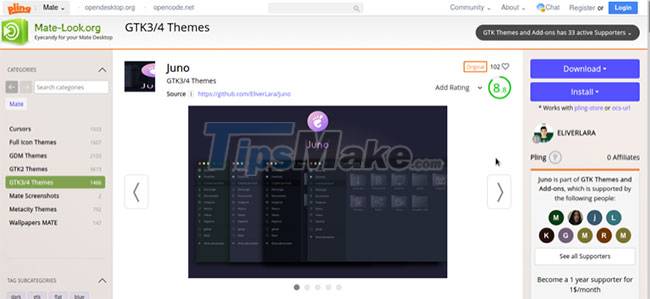
When the installation prompt appears, tap the Install button. In the window that appears asking how you want to open the ocs link, click Choose Application.
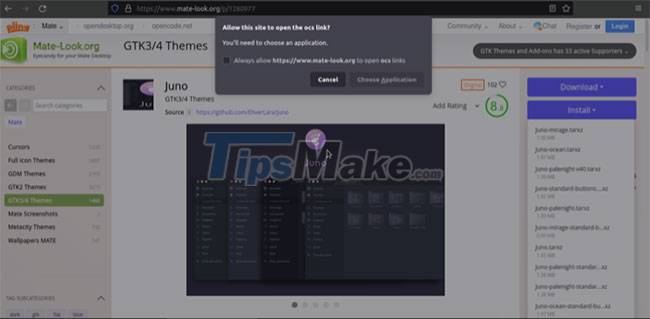
Next, select ocs-url from the list and click Open Link.
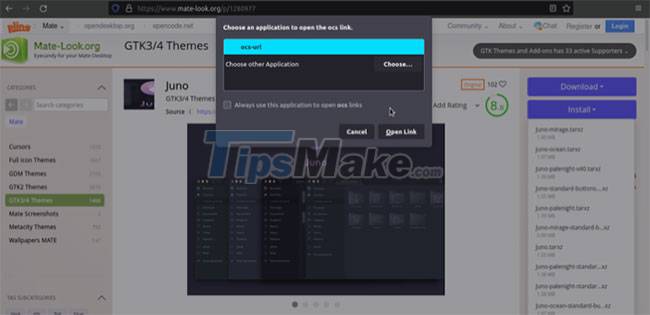
Click OK on the confirmation dialog to start downloading and installing the theme.
To apply this theme, open Appearance and select the Theme tab. The theme you just installed will appear on this screen. Click it to apply to your desktop.
If the theme supports your desktop, it should work without problems. Otherwise, you will see an error message stating that the theme is not supported. In some cases, the theme may not even show up in Appearance Preferences.
Besides, if you want, you can also click Customize to customize some elements of this theme.
3. Change the theme using the theme file
Last but certainly not least, Linux Mint also gives you the option to set system themes using a theme file. So, if you downloaded the Mint theme from GitHub or some other source, you can install it directly to your desktop.
For this, first go to the folder where you saved/downloaded the theme and unzip the archive. Copy the theme folder contained inside this folder.
Go to the Home folder on your computer, click View and check the box next to Show Hidden Files.
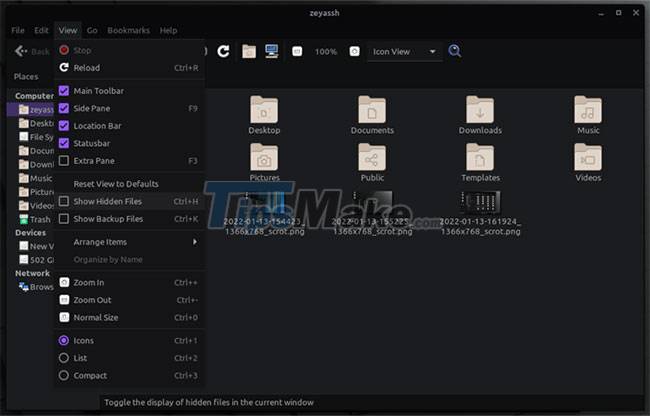
This will show all hidden files and folders inside the Home folder.
Find the .themes folder and paste the previously copied Themes folder into this folder. Similarly, if your theme has icons, go back to the theme folder, copy the icons folder and paste it into the .icons folder inside Home.
Finally, open Appearance and switch to Theme on Appearance Preferences. Here, you will see the theme you just moved to the .themes folder. Just click on it to apply as the default theme for the system. If the theme does not appear, it may be because it is not compatible with your desktop environment.
Also, if you find it difficult to find the hidden Themes folder, you can install the theme right from the Appearance Preferences window. To do this, with the Theme tab selected on the Appearance Preferences window, click the Install button.
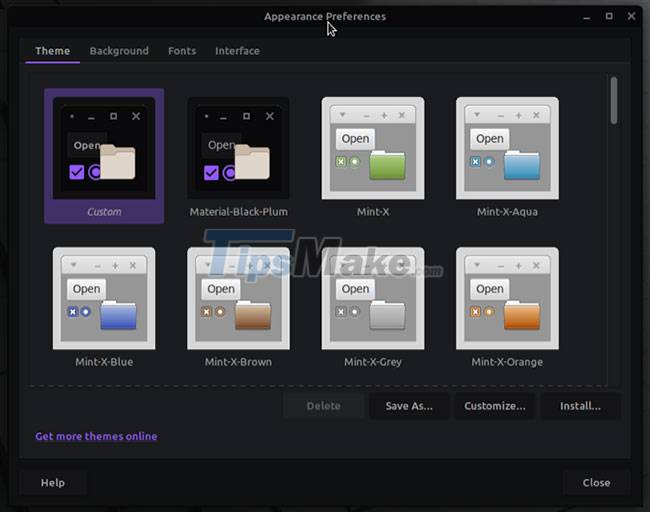
Use the file manager to navigate to the folder where you downloaded the theme. Select the theme and click Open. Wait for a few seconds and the system will install your chosen theme.
Similar to the other two methods, you can click Customize on the Appearance Preferences window to customize some elements of this theme, depending on your preferences.